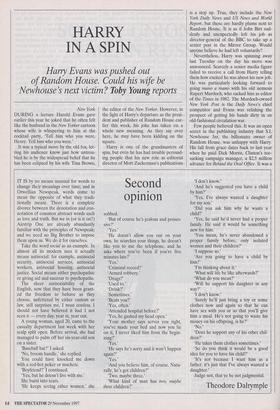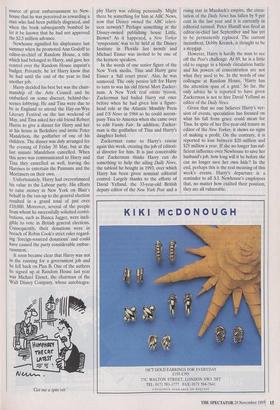HARRY IN A SPIN
Harry Evans was pushed out of Random House. Could his wife be
Newhouse's next victim? Toby Young reports New York DURING a lecture Harold Evans gave earlier this year he joked that he often felt like the husband in the New Yorker cartoon whose wife is whispering to him at the cocktail party, 'Tell him who you were, Henry. Tell him who you were.'
It was a typical move by the old fox, let- ting his audience know just how untrou- bled he is by the widespread belief that he has been eclipsed by his wife Tina Brown, the editor of the New Yorker. However, in the light of Harry's departure as the presi- dent and publisher of Random House ear- lier this week, his joke has taken on a whole new meaning. As they say over here, he may have been kidding on the square.
Harry is one of the grandmasters of spin, but even he has had trouble persuad- ing people that his new role as editorial director of Mort Zuckerman's publications is a step up. True, they include the New York Daily News and US News and World Report, but these are hardly plums next to Random House. It is as if John Birt sud- denly and unexpectedly left his job as director-general of the BBC to take up a senior post in the Mirror Group. Would anyone believe he had left voluntarily?
Nevertheless, Harry was spinning away last Tuesday on the day his move was announced. Scarcely a senior media figure failed to receive a call from Harry telling them how excited he was about his new job. He was particularly looking forward to going mano a mano with his old nemesis Rupert Murdoch, who sacked him as editor of the Times in 1982. The Murdoch-owned New York Post is the Daily News's chief competitor and Evans was relishing the prospect of getting his hands dirty in an old-fashioned circulation war.
Few people believed this. It was an open secret in the publishing industry that S.I. Newhouse Jnr, the billionaire owner of Random House, was unhappy with Harry. His fall from grace dates back to last year when he paid Dick Morris, Clinton's toe- sucking campaign manager, a $2.5 million advance for Behind the Oval Office. It was a source of great embarrassment to New- house that he was perceived as rewarding a man who had been publicly disgraced, and when the book subsequently bombed he let it be known that he had not approved the $2.5 million advance.
Newhouse signalled his displeasure last summer when he promoted Ann Godoff to editor-in-chief of Random House, a title which had belonged to Harry, and gave her control over the Random House imprint's budget. Privately, he let Harry know that he had until the end of the year to find another job.
Harry decided his best bet was the chair- manship of the Arts Council and he embarked on some discreet, behind-the- scenes lobbying. He and Tina were due to be in England to attend the Hay-on-Wye Literary Festival on the last weekend of May, and Tina asked her old friend Robert Harris to give a dinner for Harry and her at his house in Berkshire and invite Peter Mandelson, the godfather of one of his children. The dinner was duly arranged for the evening of Friday 30 May, but at the last minute Mandelson cancelled. When this news was communicated to Harry and Tina they cancelled as well, leaving the Harrises to entertain the Paxmans and the Mortimers on their own.
Unfortunately, Harry had overestimated his value to the Labour party. His efforts to raise money in New York on Blair's behalf in the run-up to the general election resulted in a grand total of just over £10,000. Moreover, several of the people from whom he successfully solicited contri- butions, such as Bianca Jagger, were ineli- gible to vote in British general elections. Consequently, their donations were in breach of Robin Cook's strict rules regard- mg 'foreign-sourced donations' and could have caused the party considerable embar- rassment.
It soon became clear that Harry was not in the running for a government job and he fell back on Plan B. One of the authors he signed up at Random House last year was Michael Eisner, the chairman of the Walt Disney Company, whose autobiogra- `Get me a spin vet.' phy Harry was editing personally. Might there be something for him at ABC News, now that Disney owned the ABC televi- sion network? Perhaps something at the Disney-owned publishing house Little, Brown? As it happened, a New Yorker `symposium' was to be held at the Disney Institute in Florida last month and Michael Eisner was invited to be one of the keynote speakers.
In the words of one senior figure of the New York media, Tina and Harry gave Eisner a 'full court press'. Alas, he was unmoved. The only person left for Harry to turn to was his old friend Mort Zucker- man. A New York real estate tycoon, Zuckerman had bailed Harry out once before when he had given him a figure- head role at the Atlantic Monthly Press and US News in 1984 so he could accom- pany Tina to America when she came over to edit Vanity Fair. In addition, Zucker- man is the godfather of Tina and Harry's daughter Isobel.
Zuckerman came to Harry's rescue again this week, creating the job of editori- al director for him. It is just conceivable that Zuckerman thinks Harry can do something to help the ailing Daily News, the tabloid he bought in 1993, over which Harry has been given nominal editorial control. Largely thanks to the efforts of David Yelland, the 33-year-old British deputy editor of the New York Post and a rising star in Murdoch's empire, the circu- lation of the Daily News has fallen by 9 per cent in the last year and it is currently in editorial turmoil. Peter Hamill was fired as editor-in-chief last September and has yet to he permanently replaced. The current incumbent, Debby Krenek, is thought to be a stopgap.
However, Harry is hardly the man to see off the Post's challenge. At 69, he is a little old to engage in a bloody circulation battle and his powers of concentration are not what they used to be. In the words of one colleague at Random House, 'Harry has the attention span of a gnat.' So far, the only advice he is reported to have given Zuckerman is not to hire David Yelland as editor of the Daily News.
Given that no one believes Harry's ver- sion of events, speculation has focused on what his fall from grace could mean for Tina. In spite of her five-year-old tenure as editor of the New Yorker, it shows no signs of making a profit. On the contrary, it is reported to lose between $20 million and $25 million a year. If she no longer has suf- ficient influence over Newhouse to save her husband's job, how long will it be before she can no longer save her own hide? In the end, perhaps this is the real meaning of this week's events. Harry's departure is a reminder to all S.I. Newhouse's employees that, no matter how exalted their position, they are all vulnerable.



















































































 Previous page
Previous page